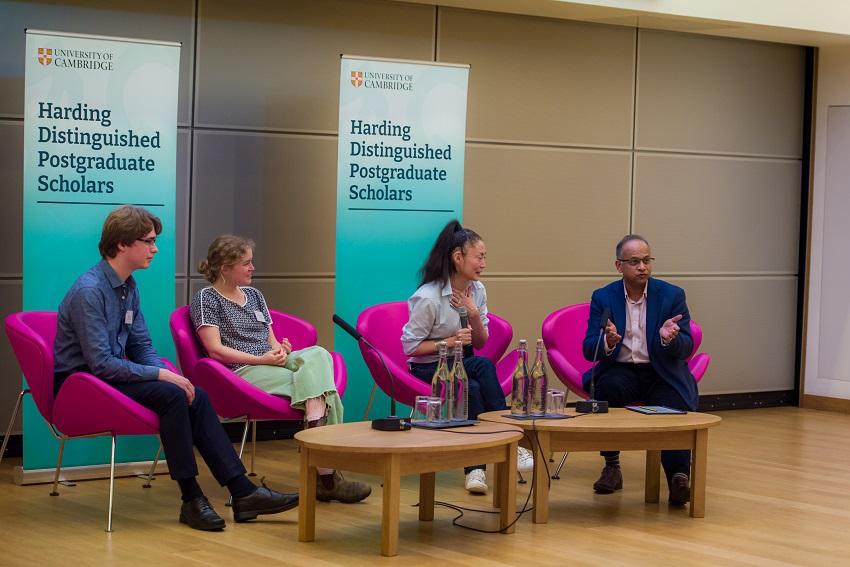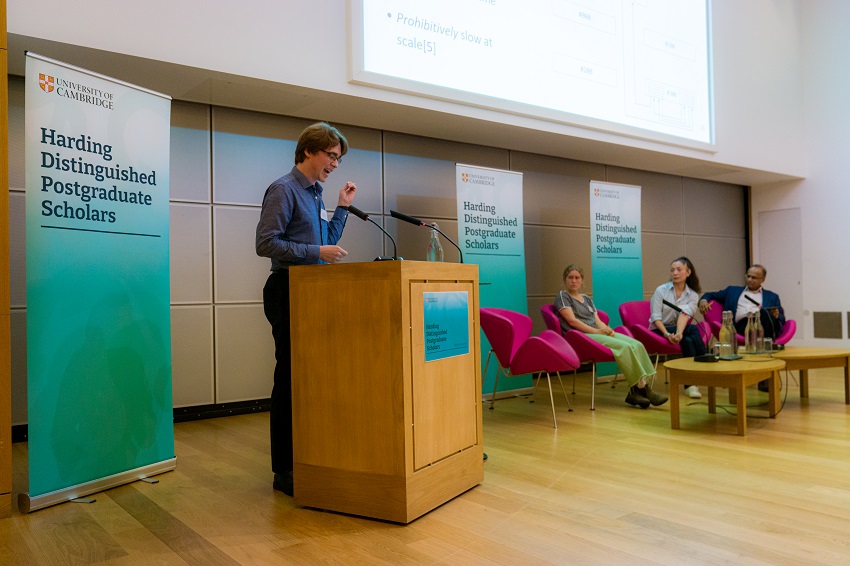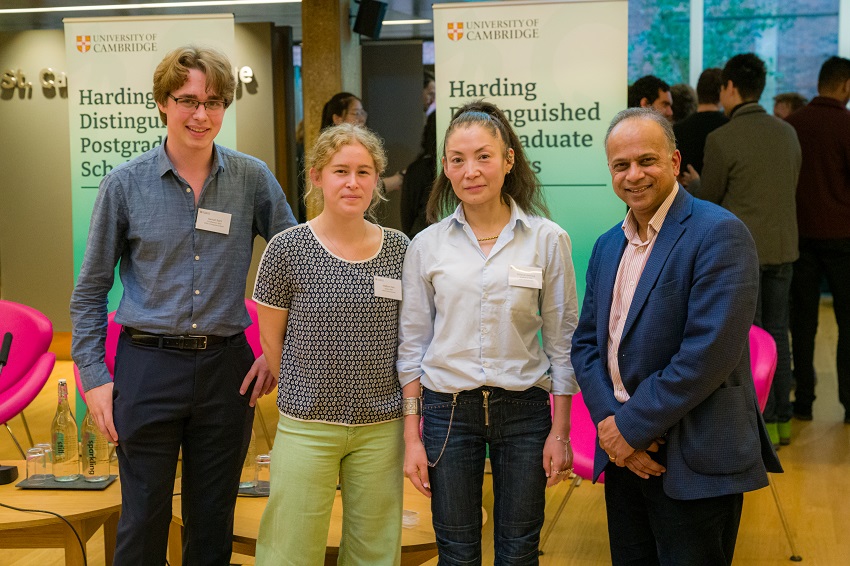
Submitted by Katherine Laidlaw on Fri, 03/11/2023 - 13:33
Depth of research and interdisciplinarity were key themes at a celebration of the programme held at St Catharine’s College.
An annual Welcome Event was held to introduce the intake of 2023 as part of a presentation and panel discussion.
Vice-Chancellor Professor Deborah Prentice, Master of St Catharine’s Sir John Benger, and James Holmes, Executive Director of the David and Claudia Harding Foundation, were among the special guests as Pro-Vice-Chancellor for Education Professor Bhaskar Vira chaired the conversation, which highlighted how the Programme allows scholars to focus their research in ways that would otherwise be difficult.
Madison East, Saltanat Amir and Samuel Stark were the three student speakers, and their research are good examples of areas that would not normally be easy to fund during a PhD.
“It demonstrated the breadth of this flagship scholarship programme and that there is real value in sharing and learning from one another as part of a scholarly community that spans multiple disciplines – spotting commonalities, sparking new ideas, inspiring novel approaches,” said Professor Vira.
"Through our scholar presentations we quickly discovered a common thread, with each of the three focusing on unravelling the inner workings of complex organisms or objects at a micro scale. Delving deeper it became apparent they have boosted their research outcomes exponentially by embracing an interdisciplinary mindset – a common theme amongst Harding Scholars."
Madison is part of the 2020 cohort, and her studies are in Earth Sciences. The fundamental question her research aims to answer is: how do corals build their skeleton?
“I care about the coral skeleton for a number of reasons,” explained Madison.
“They provide the 3D structure on which the entire coral reef community depends. Being composed of calcium carbonate, they play a role in the modern global carbon cycle. And by capturing information about the seawater around it as it grows, the skeleton’s chemical composition can be read as a record of what the ocean conditions were like in the past.
“My work falls into the field of biomineralization, but draws on techniques from geochemistry, molecular biology, mineralogy and genetics.”
Saltanat, also part of the 2020 cohort, is focusing her research on the archaeology of Eurasian Steppe Civilizations and Central Asia, particularly emphasizing Iron Age archaeometallurgy and goldsmithing technologies in Kazakhstan and Western Siberia.
“I appreciated the excellent combination of presentations from both hard and soft sciences, showcasing the wide array of research projects sponsored by the Harding Foundation,” said Saltanat.
“I particularly enjoyed the panel discussion, which featured excellent questions and fostered a positive, easy-going atmosphere."
Samuel, part of the 2022 cohort, is working in the Computer Science and Technology field, with his research centred around security in hardware.
“In my PhD I’m developing a kind of ‘ticket’ to control access to data, ensuring peripherals can only see the data they need while still being fast,” he said.
Samuel’s insight into how the Programme has provided the freedom to forge new frontiers in computer science free from commercial constraints; the opportunity it has given Saltanat to train with a goldsmith to showcase the artistry of pastoral cultures formerly dubbed primitive; and how the scheme has allowed Madison to train as one of only a handful of divers globally, skilled in a specialised blue water scuba technique used to catch and study delicate marine plankton all struck a chord with those in attendance at the Welcome Event.
“The event was a wonderful opportunity to hear about the work of some of my fellow scholars,” said Madison.
“I was impressed by their ability to explain complex concepts in a way we could all engage with and understand. Although we all work in very different fields, our presentations highlighted parallels between what we do, namely our interest in zooming in to understand the fundamentals of a particular topic or problem.
“I enjoyed the opportunity of the panel discussion to talk more freely and was inspired by the passion and motivation that my fellow panellist’s answers conveyed. It was also great to receive questions from the new cohort of scholars."
The chance to encounter fellow scholars from across all the cohorts was something that particularly appealed to Samuel about the Welcome Event.
“I loved meeting all the new faces afterwards and hearing about their projects,” said Samuel.
“There are so many freshers working on problems that I just can’t get my head around – for example, aerodynamics, early-stage cancer detection, theoretical physics - and it was almost surreal to be in the same room as them.”
All photos by: Chris Biele


